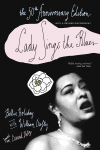
Lady Sings the Blues: the 50th Anniversary Edition
By Billie Holiday with William Dufty. New Forward by David Ritz
Harlem Moon
0-7679-2386-3
Without Billie Holiday, “Strange Fruit” never would have become the enduring protest song that became the "best song of the century" according to Time magazine. She also embodied the tragic jazz chanteuse archetype, an image shaped by her controversial memoir Lady Sings the Blues.
Many biographers and researchers caution readers not to accept the veracity of many episodes Holiday relates through Dufty. For instance, David Margolick claims in his book Strange Fruit: the Biography of a Song that Abel Meerepol, known pseudonymously as Lewis Allen, had written the song and had it seen it performed at various popular front gatherings well before Holiday sang it at Café Society. Holiday tells a somewhat different version of the tale, claiming:
“The germ of the song was in a poem written by Lewis Allen. I first met him at Café Society. When he showed me that poem, I dug it right off. It seemed to spell out all the things that had killed Pop.
“Allen, too, had heard how Pop died and of course was interested in my singing. He suggested that Sonny White, who was my accompanist, and I turn it into music.” (p. 94)
In his introduction, David Ritz cautions against focusing on discrepancies with the established historical record at the expense of hearing Holiday’s voice when reading Lady. He argues: “Her memoir is a song, a long and languid improvisation. In the mythopoetic sense, it is as true and poignant as any tune she ever sang.” (p. xii) While his point is legitimate, one still has to take aspects of the book with a grain of salt.
What is fascinating is getting Holiday’s honest take on many of the famous she jammed or rubbed shoulders with. Many might be surprised by how complimentary Holiday is to Benny Goodman: “Benny was a nice cat, never a drag. And we used to outwit my mother and his sister in order to spend some time together.” (p.56)
Another famous good guy in Holiday’s book would be Bob Hope, who came to her aid when a heckler tried to disrupt a performance of “Strange Fruit.” According to Holiday (through Dufty):
“When that cracker boy started, I stopped singing and Bob took the floor. Hope traded insults with that cracker for five minutes before he had enough and left.” (p. 105)
These kind of conversational anecdotes are the strength of Lady, giving a sense of what it might be like to get the legendary singer to reminisce over a late-night drink. As a biography, it is quite literally incomplete, ending as Lady Day faces yet another drug charge. Obviously tired of such ordeals, she still tough, Holiday wrote of the media: “Newspapers are good for one thing—they let your friends know you’ve been busted.” (p. 222)
Throughout Lady Holiday often uses the words “friends” and “fans” interchangeably. Indeed, she often relates incidents of fans she had never met reaching out to help her. Something in her singing has always reached people on a very personal level, creating a sense of intimacy. Lady Sings the Blues furthers that connection. Some fault it for furthering negative stereotypes of jazz artists as junkies, or for taking liberties with the truth. It does have the intimacy of Holiday’s recorded work and a plain-spoken directness, making it a book every Lady Day fan should read at least once and come to terms with.
The best way to come to terms with Holiday herself is through her recordings. For this anniversary edition of Lady there is a value-added tribute CD of songs associated with her, performed by contemporary artists. As is usually the case with tribute anthologies, some artists are better equipped to deal with the material than others. The highlight is Renee Olstead’s performance of “Good Morning Heartache,” which comes closest to capturing a Lady Day milieu. Erin Boheme also does well on an upbeat Holiday tune “Fine and Mellow.” On the other end of the spectrum, “Babyface” Edmonds’ cover of “Strange Fruit” was a flat-out mistake. There actually are some nice moments on the CD, despite its overall smoothish pedigree, but the real reason to get Lady Sings the Blues is the book itself. Whether it is her words as transcribed and shaped by Dufty, or her timeless performances, Holiday is always compelling to listen to.